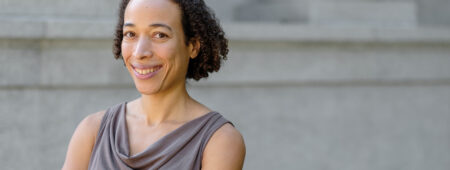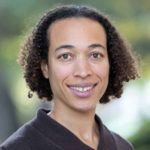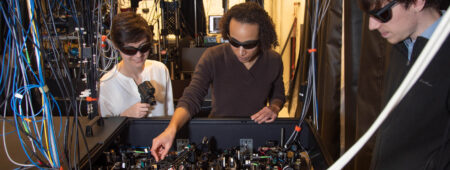Quantum Physicist Schleier-Smith on Winning 2020 MacArthur Fellowship
Hertz Fellow Monika Schleier-Smith, associate professor in physics at Stanford University, is fascinated by quantum systems of minuscule particles like atoms, electrons, and photons. Her work in understanding and manipulating many-particle quantum systems may well lay the foundation for an array of advances, from new computational paradigms to biomedical imaging and insights into black holes. In recognition of her work, Schleier-Smith was named a 2020 MacArthur Fellow.

“What I find most fascinating about quantum mechanics is the phenomenon of entanglement, which essentially says that information, instead of being something that has to be stored locally like a bit in a computer, can actually be stored in a nonlocal way,” said Schleier-Smith, a member of the Hertz Foundation Board of Directors.

Under ordinary circumstances, atoms interact with other atoms in proximity. “That is true even with very well-controlled systems in our lab, where we cool and trap atoms with lasers and we have a high degree of control over them. They will ordinarily only interact when they’re close together,” she said.
That is, until Schleier-Smith and her team hit the atoms with light to generate entanglement between the atoms. The atoms, communicating via photons, become inextricably linked so that whatever happens to one instantly affects the other, no matter how far away it is.
“The atoms become linked in the sense that when we measure the states of two different atoms, the outcomes are correlated and there is information contained in the correlations that cannot be obtained from either atom alone,” she said.
The atoms’ long-range interactions are a little like a Zoom call, she explained. “If I only talk to my next-door neighbor, that is dramatically different than if I can talk to my collaborators in Europe in terms of the way that wisdom spreads and ideas develop. The ability to have a Zoom call with anybody in the world is much more conducive to efficient scientific collaboration and to generating new ideas.”
Discovering how quantum information spreads
By advancing control over the ways in which quantum information can spread, and by measuring the speed with which it spreads, Schleier-Smith hopes to further fundamental understanding of entanglement, with an eye toward ultimately enabling technological applications.
One motivation for studying entanglement comes from the Heisenberg uncertainty principle, which posits that one can’t know where something is and how fast it’s moving at the same time, Schleier-Smith said. “That might sound surprising: you know you parked your car in your garage and it’s not moving, so you say you know both of those things. But actually, if you want to know where an individual atom is, you have to interact with it. You bounce a photon off an atom, but by measuring the system, you are perturbing it. When you’re dealing with something very small, that perturbation matters.”
Schleier-Smith hopes that understanding the fundamental aspects of quantum states will translate into real-world applications, as advances in physics have in the past. She points to the development of magnetic resonance imaging (MRI) in the mid-20th century as an early application of research on the basic quantum mechanics of magnetism.
Schleier-Smith’s field draws inspiration from theoretical ideas in quantum gravity and from condensed matter physics, which deals with material science. “I think that my willingness to engage with these subfields of physics and see new connections and new ways that the atomic physics toolbox can be used to tackle questions from other areas is a part of the reason why I received the MacArthur award. I’m eager to connect with different areas of physics,” she said.
Some of Schleier-Smith’s best problem solving happens while exercising. Riding her bike home from the lab, “my mind would start working on whatever problem needed solving. It seems a little dangerous, biking and thinking about physics, but being outside in the fresh air definitely helps clear my brain to solve problems,” she said, laughing. “Biking and running help sort things out in my head. I find more clarity and can determine my priorities and what approach I want to take.”
She credits her Hertz Fellowship, in part, with helping her establish a healthy work-life balance. She ran the Boston Marathon six times, starting her senior year at Harvard University and continuing during her doctoral studies at the Massachusetts Institute of Technology. She also rowed with the MIT rowing team, sculled with a Boston boat club, and hiked on weekends. Far from shirking her academic responsibilities, she won the Hertz Foundation Thesis Prize.
“I feel very honored to have received the MacArthur award,” she said, adding that she has not yet decided how to spend the funds. The fellowship, presented by the John D. and Catherine T. MacArthur Foundation, comes with a no-strings-attached award of $625,000.
Her mother, who holds a PhD in linguistics, was particularly pleased that Schleier-Smith received the award for her ideas, rather than for a specific research project. “My mother says I got that from my father, who unfortunately died when I was a baby,” Schleier-Smith said. “He was an urban planner, the creative one with ideas. But it is my mother who encouraged a sense of curiosity and an interest in science in my brother and me.”

High expectations for the field
Expectations are sky-high for the field of quantum technology, as evidenced by a spike in public and private investment in the last few years, Schleier-Smith said. Google and IBM are pursuing quantum computing opportunities, though it’s not yet clear what the first serious use for quantum computers will be.
The federal government has invested in quantum mechanics as well. In December 2018, President Trump signed the National Quantum Initiative Act into law, committing $1.2 billion over five years to accelerate the development of quantum technology and its applications. Earlier that year, the Department of Energy announced $218 million in funding for 85 research awards in the emerging field of quantum information science. Schleier-Smith is the principal investigator of one of these awards and co-PI on two of them. She is also involved in the recently announced Q-NEXT quantum center, led by Argonne National Laboratory and SLAC National Accelerator Laboratory.
“There are so many exciting challenges in quantum science,” said Schleier-Smith. “In the lab, I might not know exactly where something is going, but I have a hunch that it’s interesting and different and new and that something may be discovered there. And that’s enough to get me excited to explore.”
About the Fannie and John Hertz Foundation
The Fannie and John Hertz Foundation identifies the nation’s most promising innovators in science and technology, and empowers them to pursue solutions to the world’s toughest challenges. Launched in 1963, the Hertz Fellowship is the most exclusive fellowship program in the United States, fueling more than 1,200 leaders, disruptors, and creators who apply their remarkable talent where it's needed most—from improving human health to protecting the health of the planet. Hertz Fellows hold 3,000+ patents, have founded 200+ companies, and have received 200+ major national and international awards, including two Nobel Prizes, eight Breakthrough Prizes, the National Medal of Technology, the Fields Medal, and the Turing Award. Learn more at HertzFoundation.org.